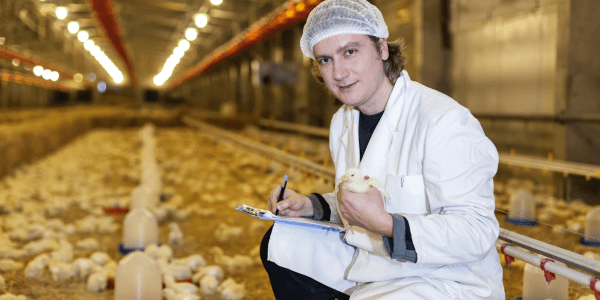Are Chicken Farms Fooling You About the Chicken Quality?
When you’re at the grocery store shopping for some chicken, you’ll notice a bunch of callouts and claims being put on the packaging. Everything from Cage Free, No Hormones Added, USDA Organic, Free Range, and more. But do you really understand the qualifications for various claims? Are chicken farms getting away with stretching the truth to trick you into thinking their chicken is a better product than another?
In this article, I’m going to dive deeper into chicken farms and how they go about coming up with the claims they put on their packaging as well as whether or not you’re getting a better product at the higher price tag or if you’re essentially getting ripped off.
Buckle up because this article on chicken farms is going to ruffle some feathers (pun intended).
Table of contents
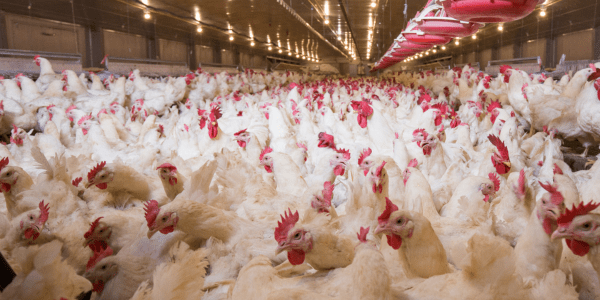
Disclaimer: This article is based on research I have done at the time of publishing this article. The USDA can change rules and regulations quickly, and it’s important to stay up to date on the various claims being made by places such as chicken farms so that you fully understand the quality of the product you’re purchasing.
No Chicken Farms Use Hormones
At least they’re not supposed to. Could they be sneaky? I’m sure they could. But chicken can grow to be full-sized and slaughtered in a matter of only a few months. So, is the extra cost necessary if they want to cheat the system? My guess would be no.
Related Article: Meal Prep Companies Like Chicken Pound Are Undervalued
These days, the buzzword seems to be “hormones” and “steroids” when discussing food products. If you picked up a poultry product, you’ve probably seen “no hormones” or “no steroids” used in the product. Well, what you don’t understand is that it’s a given because it’s the law.
The United States does not permit the use of hormones or steroids in any poultry products on any chicken farms throughout the US. The FDA has made it clear that the use of hormones or steroids to speed up chicken growth is not permitted.
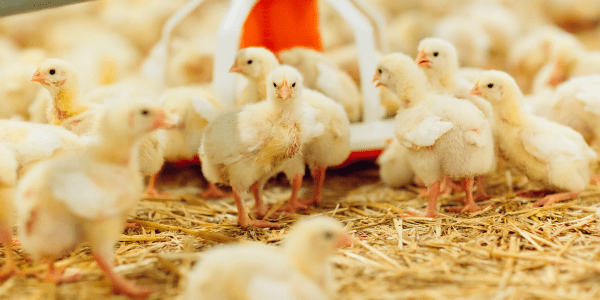
What does this mean for you? It means that all chicken farms can make this claim on their packaging, which is why you see nearly every poultry product on the shelves of your local grocer saying the product is free from hormones and steroids. Using “Raised without Hormones” and similar wording is like telling you I have “free air” for you.
USDA Grade A is More Like a Beauty Pageant
When you think of Grade A, you’d assume it’s the best quality poultry out there and that the taste is superior to others. Sadly, that’s not the case. When you think of Grade A beef, that’s a system that actually makes sense as it names the overall quality of the beef, and such a grading typically means the beef tastes better. With chicken from chicken farms, that’s not accurate.
To get approved for the Grade A stamp of approval from the USDA, they’re literally looking at the appearance of the chicken from the chicken farms. The taste from grade to grade typically does not change unless there is something wrong with the chicken itself. But to get the Grade A status, they look at the distribution of fat under the skin of the chicken, meat plumpness, bone structure, tears in the skin, no discoloration, and the presence of feathers.

Ultimately, if the chicken looks good from its appearance alone, it gets the thumbs up.
Something else to note, if chicken farms don’t get the stamp of approval for USDA Grade A with their chicken, they will use the B and C grade chicken as ground chicken products or processed products. So, when you’re cooking up some ground chicken, just know that it’s not the highest grade unless chicken farms take their best chickens and use them as ground chicken products.
Humanely Raised Could Be a Stretch
I’m unsure if you’ve ever seen chicken farms, but they have barns (also called chicken houses) that allow the chicken to “roam free.” That’s actually quite funny, as many chicken farms where the chickens are in a barn, the chickens are literally on top of each other with little to no space at all. Sure, when they are chicks, everything is nice and roomy, but as they grow, things get smaller and more confined.
For chicken farms to be able to claim “humanely raised,” they would need to allow the chickens to engage in their natural behaviors and ensure that they are raised with limited stress, adequate shelter, and sufficient space. Do all chicken farms meet these claims? Nope.
Free Range Truly Means Nothing (I’m Not Kidding)
If you know about chicken farms, do you know how you get approved to put “free range” on your products? Here’s the process, you beg the USDA to approve you. Well, sort of. Why? Because there is no federal government definition of what exactly “free range” means. It’s literally on a case-by-case basis. But wait… it gets even better.
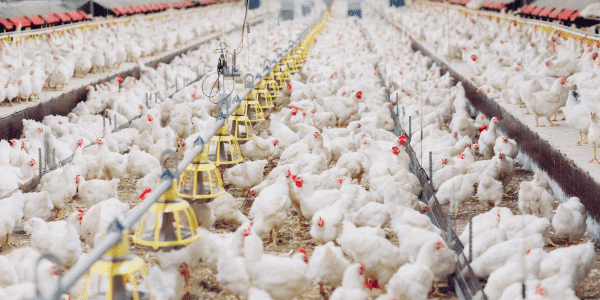
For chicken farms to get the USDA to approve their claim, all they need to do is provide the chicken with access to the outdoors for at least part of the day, regardless of whether or not the chicken actually move outdoors and out of the barn or not.
Unfortunately, chickens are much like humans, they don’t like to move far away from their food and water source. Therefore, many of the chickens never leave the chicken house or chicken barn.
Even worse, and I’m not saying chicken farms do this, but can you prove to me that they don’t and that there could be a wire fence that only provides a very small amount of room for the chicken to access the outdoors and walk out of their chicken house or chicken barn. Not all the chickens would be able to go outside all at once. Yet, this would still qualify as “free range” because the chickens technically have access to the outdoors, regardless if they go out or not.
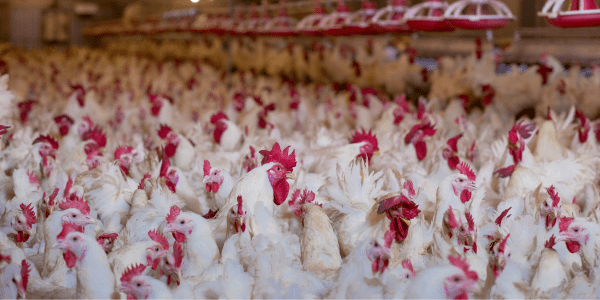
Most people assume that “free range” on a poultry label means that they are kept outdoors all the time and roam around freely on a farm. Nope. That is not the case. In fact, you could put a “USDA-verified free range chicken” on your plate tonight, and that chicken may have never stepped foot outside the barn at chicken farms.
Cage-Free is a Completely Worthless Claim
Having “cage-free” on your poultry packaging literally means nothing. The term only applies to laying hens for egg collection, and chicken farms can only get away with this because it’s not false. Laying hens are typically found in cages to make it easier to collect the eggs they lay versus having them all over the place searching for them like it’s Easter morning.
The definition of “cage-free” is nothing more than the ability for the chicken at chicken farms to be able to roam around freely in an enclosed area such as a building or outdoors. So again, the claim sounds great, and you may think you’re getting a better quality product or that the chicken at the chicken farms were treated more humanely, but it’s all the same across the board for all poultry brands and chicken farms.
Everyone Can Use Farm-Raised on Their Labels
In case you weren’t aware, there are things called chicken farms (if you didn’t pick up on that from the title, I don’t know what to tell you). The chicken you find in your local grocery stores comes from chicken farms, which are regulated by the governing powers to ensure compliance. And because these locations are called chicken farms, everyone can use “farm-raised” on their packaging — which is literally a no-brainer, but people who don’t know any better would assume “farm-raised” would be a better quality and healthier product.
It’s not like these big chicken brands are grabbing chickens from the backyards of homesteaders, they’re utilizing chicken farms. Therefore, while the label may not state the obvious, every brand you find in the grocery store that sells poultry is “farm-raised.”
You’ve Got to Be Cluckin’ Kidding Me?
As you can see, all of those fancy claims and callouts you see on poultry packaging essentially don’t mean anything. If just about all chicken farms can make the same claims due to vague and ambiguous regulations, are you really getting a better, healthier product or just some fancy marketing to make you feel good?
Let’s face it, chicken farms and poultry brands are fooling you. There’s no way around it. But then again, it’s no different than what’s going on with fast food today, where they claim the food is better quality and healthier. News flash, it’s not. You’re just getting that feeling from reading their brilliant marketing. But we’ll save that topic for another day.
As they say… “The more you know.” Hopefully, this article opened your eyes to the deception going on with poultry brands and chicken farms.
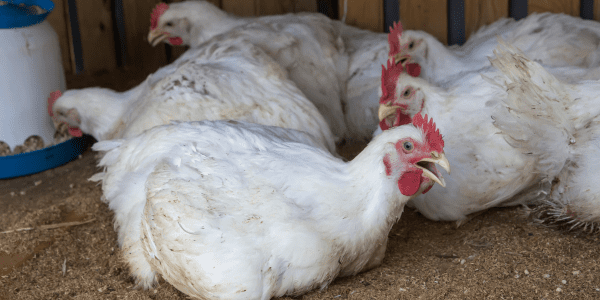


*Disclosure: This article may contain affiliate links or ads, which means we earn a small commission at no extra cost to you if you make a purchase through these links. These commissions help support the operation and maintenance of our website, allowing us to continue producing free valuable content. Your support is genuinely appreciated, whether you choose to use our links or not. Thank you for being a part of our community and enjoying our content.
PLEASE CONSIDER SHARING THIS ON YOUR SOCIAL MEDIA TO HELP OTHERS LEARN MORE ABOUT THIS TOPIC. SIMPLY CLICK BELOW!

